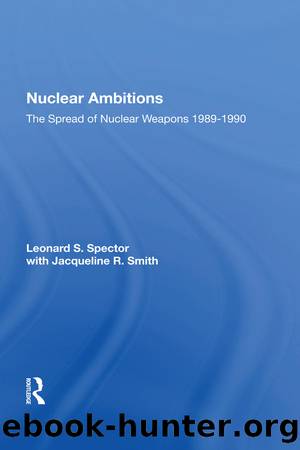Nuclear Ambitions: The Spread of Nuclear Weapons 1989-1990 by Leonard S Spector

Author:Leonard S Spector [Spector, Leonard S]
Language: eng
Format: epub
Tags: Political Science, General
ISBN: 9780429734656
Google: zimNDwAAQBAJ
Goodreads: 44598325
Publisher: Routledge
Published: 2019-03-04T00:00:00+00:00
Political and Technical Developments
Brazilian nuclear policy remained relatively unchanged through the remainder of Sameyâs term, which ended March 15, 1990, when he ceded power to Fernando Collor de Mello. Collor, a right-of-center former state governor, won the presidency in December 1989, in the countryâs first direct elections for a national leader since the military had seized power in 1964.38
CNEN strengthened under Sarney. Impatient with the chronic delays that had beset the safeguarded nuclear program, on August 31, 1988, Sarney reorganized Brazilâs nuclear energy industry. The restructuring abolished Nuclebras, the government corporation that had been responsible for implementing the various facets of the 1975 agreement with West Germany, and reassigned its responsibilities to other government agencies.
Under the new organizational set-up, the National Nuclear Energy Commission (CNEN), which had long been allied with the military and coordinated the unsafeguarded activities of the military at Ipero, IPEN, and other research centers, acquired authority over the most sensitive elements of the safeguarded program, namely, the enrichment facility and related units that had been built at Resende under the 1975 agreement with West Germany.39 This organizational merger triggered fears on the part of some observers that Brazil might illicitly transfer technology from the safeguarded to the unsafeguarded program; this issue had become a matter of concern to the IAEA and West Germany even before the August 31 realignment.
The CNEN was to report to a new Supreme Council on Nuclear Policy composed of representatives from nineteen ministries, including each of the armed services, and non-governmental appointees. In actual practice, however, the Council was dominated by the countryâs military and its role appeared to be largely advisory.40
The reorganization also assigned responsibility for running the countryâs single operating nuclear power reactor, Angra I, to Brazilâs electric power corporation, Electrobras. Electrobras was also placed in charge of completing the two additional nuclear power reactors Brazil had under construction, Angra II and III. Electrobras had had no previous involvement in the countryâs nuclear program41
Constitutional restrictions. On September 3, 1988, Brazil adopted a new constitution, establishing permanent democratic institutions and defining the role of government in many other aspects of Brazilian life. In the nuclear realm, the charter provided that âany nuclear activities within the national territory will be permitted only if for peaceful purposes and if approved by the National Congress.â42 The provision appears to rule out the development of nuclear weapons and to bring all nuclear activities under civilian control. Moreover the very inclusion of a provision on nuclear matters in a national constitution is unusual and appears to signal a serious commitment to non-proliferation.
In practice, however, the impact of the provision may be more limited. First, it does not rule out the accumulation of weapons-grade nuclear materials free from external non-proliferation controls and thus would permit Brazil to develop a ready nuclear weapons option. Nor does the provision prohibit the development of so-called peaceful nuclear explosives or even the conducting of nuclear tests under this rubric.
Moreover, the provision does not establish mechanisms for day-to-day civilian control of nuclear
Download
This site does not store any files on its server. We only index and link to content provided by other sites. Please contact the content providers to delete copyright contents if any and email us, we'll remove relevant links or contents immediately.
| Automotive | Engineering |
| Transportation |
Machine Learning at Scale with H2O by Gregory Keys | David Whiting(4313)
Never by Ken Follett(3958)
Urban Outlaw by Magnus Walker(3400)
OPNsense Beginner to Professional by Julio Cesar Bueno de Camargo(3289)
Sapiens and Homo Deus by Yuval Noah Harari(3076)
Will by Will Smith(2922)
A Short History of Nearly Everything by Bryson Bill(2699)
Hooked: A Dark, Contemporary Romance (Never After Series) by Emily McIntire(2556)
Rationality by Steven Pinker(2367)
Borders by unknow(2316)
The Becoming by Nora Roberts(2205)
Holy Bible (NIV) by Zondervan(2126)
A Short History of War by Jeremy Black(1849)
HBR's 10 Must Reads 2022 by Harvard Business Review(1846)
The One Percenter Encyclopedia by Bill Hayes(1827)
Freedom by Sonny Barger(1801)
Go Tell the Bees That I Am Gone by Diana Gabaldon(1758)
A Game of Thrones (The Illustrated Edition) by George R. R. Martin(1750)
Five Ways to Fall by K.A. Tucker(1744)
